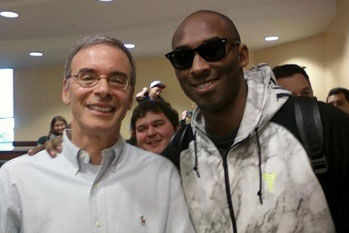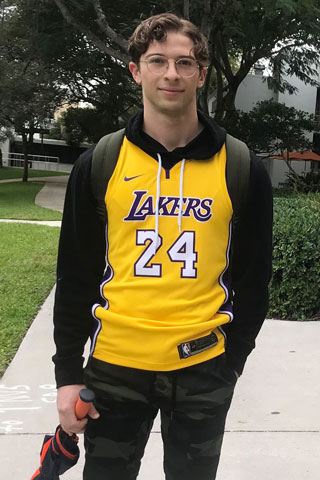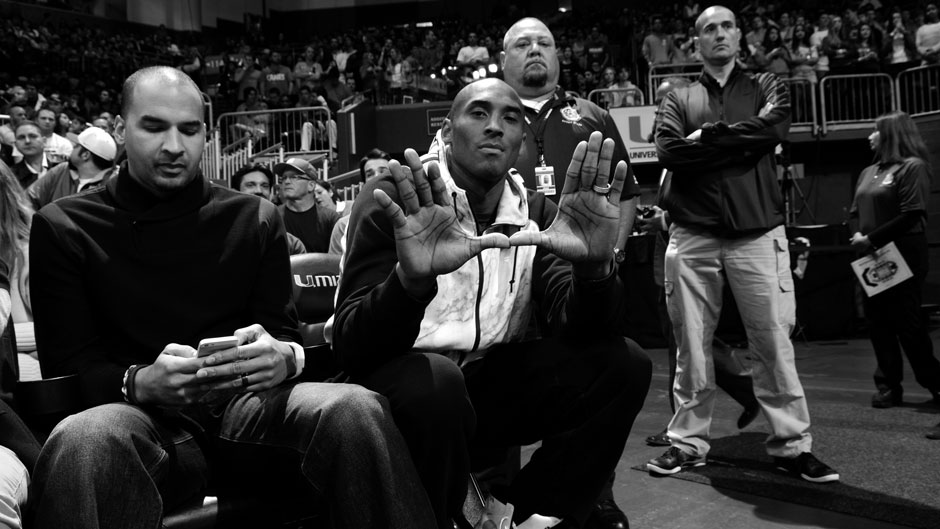His achievements transcended the basketball court, where he won world championships and Olympic gold. He helped improve the lives of youth and families through his foundation. He advocated for the homeless, supported women’s sports, started a media company, and won an Academy Award for an animated film based on his ode to basketball.
Kobe Bryant was larger than life both on and off the court, and his tragic death on Sunday in a helicopter crash that claimed eight others—including his daughter and two other players on the girls’ basketball team he coached—is being mourned all over the world by millions of strangers who felt like they knew him.
“That’s the thing about celebrities, be they sports figures, entertainers, or politicians: we are so connected to them through our participation in their lives that feelings of loss and grief are natural,” said Sannisha Dale, an assistant professor of psychology at the University of Miami, who, like most people, never met the legendary Los Angeles Lakers shooting guard, but calls him by his first name.
“Kobe is part of our memories,” she continued. “When he got drafted at 17 or won five championships and two Olympic gold medals, those are not just his memories, they’re ours, too. I think back to when Michael Jackson died. Oh my, how I cried. Not because I knew Michael Jackson personally, but I knew how it made me feel to dance to his songs or watch him moonwalk.”
That’s one reason why, Dale said, there’s such a public outpouring over Bryant’s death, from Japan to Israel, and L.A. to the University of Miami, where Bryant paid a surprise visit two years before his 2016 retirement. Usually, Dale said, grieving is done privately, quietly, with other loved ones who are uncomfortable sharing their reminiscences with others who didn’t know the departed. But in Bryant’s case, we feel comfortable sharing our grief because it’s collective.
“We know it’s going to be affirmed because other people get it and are experiencing it at the same time,” said Dale, who has an interest in how culture affects emotional well-being. “There’s also the fact that we think of legendary figures as somewhat invincible. His death was shocking, and it reminds us that death is inevitable and sometimes capricious, irrespective of one's legendary status.”
The shock was particularly difficult for those at the Miami Herbert Business School who actually met Bryant in January 2014. The 18-time NBA All-Star asked to sit in on Jeffrey Weinstock’s marketing management class when he was in town for a game against the Miami Heat. But for security reasons, Bryant requested that his attendance not be announced in advance.

So, Weinstock emailed his students shortly before the afternoon class started, telling them that an important guest would attend and to show up prepared. When Bryant walked in, the room erupted in cheers and applause.
“The students were obviously thrilled,” Weinstock recalled, noting he will always remember how Bryant wanted to make an impact off the basketball court. “He was a brilliant athlete who liked business and marketing. He was creating an enormous group of business ventures, using his fame and wealth and ambition to build something beneficial to everyone.”
Walking to class on Monday wearing Bryant’s No. 24 jersey over his hoodie, Stavros Kalemakis, a senior majoring in chemistry, was still visibly shaken by Bryant’s sudden death and awed by his enduring legacy.
“When I heard the news, my heart sank,” said Kalemakis, who grew up in Miami but was a lifelong fan of the Lakers. “I didn’t want to believe it. Kobe was more than just a basketball player; he was an icon. He did more for the sport than anyone of his generation. Just look at what he did with his daughter. When he retired, he became the coach of a traveling girls’ basketball team.”

Bryant not only coached his 13-year-old daughter Gianna’s AAU basketball team out of his Mamba Sports Academy, he was an ardent fan and devoted ambassador for women’s sports, particularly basketball, at all levels—which had a profound impact.
“He wasn’t just vocal, he watched women’s sports and advocated for women’s equality. And, when someone of that caliber does so, it truly makes a difference in legitimizing women’s sports,” said Windy Dees, associate professor of sport administration in the School of Education and Human Development. “It’s really unfortunate to lose someone so amazing in the sports industry as a whole, but especially a male star who was supporting women’s sports so authentically and prominently.”
Dees’ colleague at the School of Education and Human Development, Tywan Martin, an associate professor of kinesiology and sport sciences, said Sunday’s news hit him differently than anything he has ever experienced.
“Only the passing of Muhammad Ali and Prince come close,” Martin said. “I altered my day to take an hour walk just to clear my mind. He was a real-life hero for so many people. You got to live through him because he allowed you to live through him.”
Marvin Dawkins, a professor of sociology in the College of Arts and Sciences, said a unique aspect of Bryant’s legacy will be his passion for writing and his desire to reach young people through written and spoken words. “When he won an Oscar (for his short film, “Dear Basketball”), that was only the beginning of a realization that his life and accomplishments transcended the world of sports and could be used to touch young people throughout the world.”
News@TheU writer Ashley A. Williams contributed to this report.

